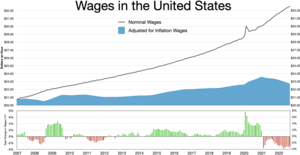Hourly worker

An hourly worker or hourly employee is an employee paid an hourly wage for their services, as opposed to a fixed salary. Hourly workers may often be found in service and manufacturing occupations, but are common across a variety of fields. Hourly employment is often associated but not synonymous with at-will employment.
Most countries operate minimum wage systems, which set a minimum rate of pay for hourly employees. As of October 2023, France has the highest hourly minimum wage at $13.80 per hour.[1] The United States has a comparatively low minimum wage for hourly workers at $7.25 per hour. Unusually, this rate does not apply to tipped employees, who are only entitled to an hourly wage of $2.13, which contributes to a strong tipping culture in the country.[2][3] As a tipped employee, wages plus tips must equal the standard minimum wage or the employer is required to provide the difference.
Earned wage access
Earned wage access is a financial service offered to hourly employees who are given access to a portion of their accrued paycheck until the end of their payroll cycle.[4]
The technology to access the earned income can be implemented in a variety of ways: automatically credited to a prepaid card, deposited via ACH to the user's existing direct deposit or, in a bifocal approach, the accrued income is transferred to a bank account opened by the EWA provider.
In August 2016, Uber pioneered EWA in partnership with Green Dot, allowing drivers to request their earnings after each ride in exchange for a small payment.[5]
In July 2018, ADP, America's largest payroll provider, began offering the EWA solution in its marketplace.[6]
In May 2019, Lyft introduced a similar feature for its drivers in partnership with Mastercard.[7]
On April 19, 2024, Governor Laura Kelly (D-KS) signed the fourth Earned Workforce Access Act (EWA) into law in the United States.[8] The bill received broad bipartisan support in the Kansas House and Senate.
Earned income access providers are positioned as an ethical solution for payday lenders because they typically charge a small flat fee rather than interest, and there is no recourse, credit implications or underwriting for earned income access transactions.[9][10][11]
References
- ^ "These are the countries with the highest and lowest minimum wages". 2023-10-03.
- ^ "State Minimum Wage Laws | U.S. Department of Labor".
- ^ "Minimum Wages for Tipped Employees | U.S. Department of Labor".
- ^ "Earned Wage Access: what it is and how it works". www.lano.io. Retrieved 2024-06-26.
- ^ "Uber Expands Instant Pay For Drivers". www.pymnts.com. Retrieved 2024-06-26.
- ^ "ADP Adds Earned Wage Access to Payment Platform". www.pymnts.com. Retrieved 2024-06-26.
- ^ "Mastercard, Lyft launch co-branded banking, debit card with immediate driver pay". www.paymentsdive.com. Retrieved 2024-06-26.
- ^ "Democrat Governor Laura Kelly Signs Kansas EWA Bill into Law". www.payactiv.com. Retrieved 2024-06-26.
- ^ "Home". www.earnedwageaccess.info. Retrieved 2024-06-26.
- ^ "How to spot a payday loan posing as "earned wage access"". www.fourth.com. Retrieved 2024-06-26.
- ^ "Early Access to Earned Wages vs. Payday Lending". news.bloombergtax.com. Retrieved 2024-06-26.
